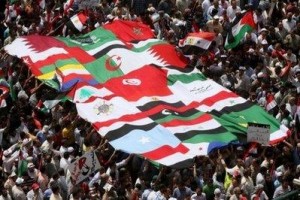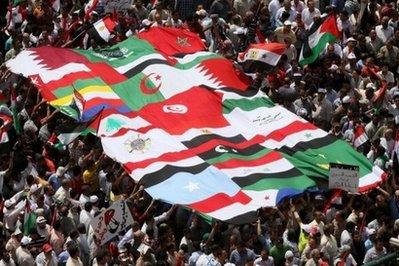
In the shadow of brutal crackdowns and severe repressive attacks launched by entrenched autocrats against pro-democracy movements throughout the Arab world, the United Nations (UN) Human Rights Council began its latest session on the 12th of September with an unprecedented number of human rights situations in the Arab region included on its agenda. Reports and recommendations on the human rights situations in Libya, Sudan, Syria, and Yemen were presented before the Council during its 18th Session. A high-level panel on the “promotion and protection of human rights in the context of peaceful protests” also took place. Yet, according to the Cairo Institute for Human Rights Studies (CIHRS), by the time the session ended on the 30th of September, it had become clear the international community was unwilling to use this important opportunity to provide real protection and support for Arab citizens and human rights defenders pushing for democratic reform.
“Human rights and democracy activists from throughout the Arab world came to the Human Rights Council with the hope that their voices would finally be heard and that the Council would provide support and protection for peaceful protestors and democratic movements,” said Mr. Jeremie D. Smith, Director of Geneva office CIHRS: “While it is positive that several country situations from the region were addressed by the Council, we saw a weakening of many of the initiatives dealing with the Arab region, and no concrete action was taken to provide protection or open the door for accountability”.
On the 19th of September the UN Office of the High Commissioner for Human Rights (OHCHR) delivered a report on its recent mission to Yemen to look into rights violations occurring in the country. The report recommended the Council to establish an “international, independent and impartial investigation” into grave rights violations occurring in the context of protests. The High Commissioner also called for the establishment of an OHCHR presence within Yemen to monitor the situation. The resolution put forward by Yemen, the United States and Netherlands, and passed by the Council on the 29th of September, failed to heed these recommendations, and only noted “the announcement of… Yemen that it will launch [domestic] investigations.” But, as noted by the report of the OHCHR, the government of Yemen appears unwilling or unable to institute sufficient accountability measures to ensure further rights violations and conflict are avoided.
On the 27th of September, a joint letter by human rights NGOs urging Council member states to take stronger action, called the Yemen resolution, which was eventually adopted without a vote, “a clear failure by the international community to protect innocent civilians against violent attacks and brutal repression.” According to the letter, “the resolution on Yemen…lacks decisive action designed to provide accountability… or protection for the victims of grave rights violations”.
Mr. Ziad Abdeltawab, Deputy Director of CIHRS, said: “This resolution completely ignores clear recommendations made by the High Commissioner. In effect, it undermines momentum on this issue at the UN, and abandons the people of Yemen at the very moment when international pressure could have saved lives and supported the cause of democracy.” Over the last ten days the situation in Yemen has witnessed an unprecedented deterioration; scores of people have been killed since September 19th when the government began resorting to the use of full military force against peaceful protesters.
Only weeks after a UN report found evidence that crimes against humanity may have been committed in the South Kordafan area of Sudan, a long-standing human rights mandate on the country was “downgraded” during the session. The resolution on Sudan, adopted without a vote on the 29th of September, renewed the country mandate on Sudan for another year, but reclassified it from a “situation requiring the attention of the Human Rights Council,” to one involving “technical assistance and capacity building.” Instead of providing a strong condemnation of the ongoing human rights crises in the country, it repeatedly “commends” Sudan for its “cooperation” and recognizes “the efforts of the Government of Sudan in the promotion and protection of human rights”.
With the creation of the new state of South Sudan the existing UN Independent Expert on Sudan no longer covers this area. Ignoring calls from human rights defenders from South Sudan on the need for continued engagement by the international community, a resolution “welcoming the Republic of South Sudan as a new State” was adopted, but failed to create a new mechanism to monitor the situation.
A report released on 15th of September by the fact finding mission on Syria established at a Special Session of the Human Rights Council in April, and presented to the Council on the 19th of September, concluded that crimes against humanity appear to have been committed by the government of President Al Assad against peaceful protestors. The UN High Commissioner for Human Rights presented the findings of the report to the UN Security Council on the 18th of August and urged the body to refer the situation to the International Criminal Court (ICC). Despite these findings and a clear call for action by the High Commissioner, Security Council member states such as China, India and Brazil, lead by Russia, continue to resist a referral of the situation to the International Criminal Court or the enactment of strong sanctions. Partially in response to the inaction of the Security Council, the Human Rights Council held a second Special Session on Syria in August, during which a Commission of Inquiry was established to investigate crimes against humanity in Syria, and hold those responsible for such crimes accountable. During the Special Session, Russia, China and Egypt attempted to obstruct the establishment of this Commission. The new Commission of Inquiry is set to transmit its initial findings to “all relevant United Nations bodies” in the end of November.
In a passionate speech before the Human Rights Council on the 19th of September, prominent Syrian human rights defender Mr. Hathiem Maleh said: “As confirmed by the report before us, millions of Syrian people now find themselves prisoners, surrounded by tanks and snipers and machine guns while crying out for freedom… Several weeks ago the High Commissioner delivered the report before us to the Security Council and requested it to refer the situation in Syria to the International Criminal Court, a request that was ignored. Today I urgently ask those states who failed to fully support this request to reconsider. When will my sisters and brothers from Brazil, India, China, Russia and elsewhere acknowledge what is already painfully clear?” Ten days after Mr. Maleh’s speech, a day before the Council’s 18th Session was due to end, the Syrian government is reported to have begun using military jets to bomb civilian targets.
“Perhaps more disconcerting than the initiatives that were weakened, are the situations that were never even considered worthy of attention,” said Ms. Laila Matar, UN Advocacy Representative of CIHRS: “While this Council has been meeting in Geneva, we have witnessed prison sentences handed down for medical doctors and human rights defenders in Bahrain, and the continued violent repression of pro-democracy protestors in the country. In Egypt, we are witnessing wide-scale efforts by the Supreme Council of the Armed Forces to quell the democracy movement through mass referral of citizens to military trials, the wide-spread use of torture by the police and military, and unprecedented attacks by the government on the freedom of human rights civil society organizations. Yet, these situations were never even up for discussion at the Council“.
The Council seemed unable to adequately deal with rights violations throughout the Arab world. Nonetheless, several important thematic initiatives relevant to the pro-democracy movements in the region were initiated. A resolution presented by Argentina and Switzerland to create a “Special Rapporteur on the promotion of truth, justice, reparation and guarantees of non-recurrence “ was passed, a mandate that may prove useful to assist countries like Tunisia, Libya, Egypt and others in addressing both past and present human rights violations in ongoing efforts to transition to democratic governance. A resolution, put forward by Sweden, was also passed that will create a “Panel on Freedom of Expression on the Internet” in March 2012, at the next session of the Council. Moreover, a “High Level Panel on the Promotion and Protection of Human Rights in the Context of Peaceful Protests,” initiated by Switzerland, was held on the 13th of September. During the panel, experts offered recommendations to the international community on how to best protect human rights in the context of protests.
Mr. Bahey eldin Hassan, General Director of CIHRS, speaking on the UN panel, called on the Human Rights Council to work towards the creation of an international “Declaration on the guidelines and principles for the promotion and protection of human rights in the context of peaceful protests,” and submitted “suggestions of guidelines and principles that have arisen out of lessons learned within the Arab region, and which…should be included in any such declaration”.
On the 30th of September, the day the Council came to a close, Mr. Hassan said, “If the international community cannot find the political will to support the democratic aspirations of citizens in particular countries of the Arab region, it is hoped that they can at least begin to more clearly articulate what type of behaviour is expected from countries experiencing wide spread protests; doing so might offer a way out of the double-standards and politicisation that has characterized the international response to democracy movements in the region. I urge countries like Libya, Tunisia and Egypt, in response to the suffering their citizens have endured recently, to support this type of initiative”.
A resolution was also passed by the Council that calls on the UN General Assembly in New York to reinstate Libya as a member of the Human Rights Council after it was suspended in March of this year for attacks carried out against civilians by the former government of Gaddafi. While no resolution on the issue of Israel and Palestine was presented at the session, the request by the PLO for acceptance as a full UN member state by the Security Council was focused on by several civil society organizations, including CIHRS, who called for all UN member states to recognize Palestine as a fellow UN member in line with the right of the Palestinian people for self-determination.
Share this Post

